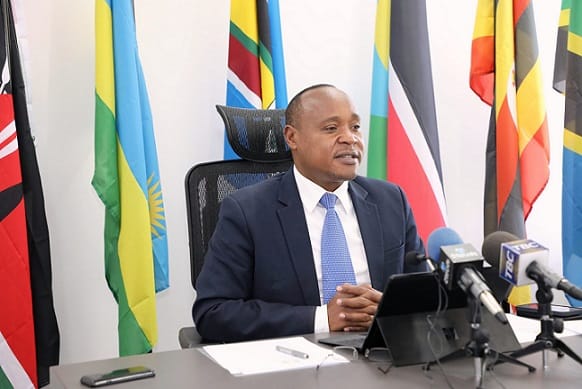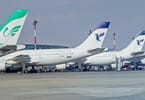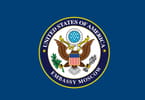Onye odeakwụkwọ ukwu nke Ogbe East Africa (EAC), Dr. Peter Mathuki, said this week that it is about time that Africa started to interrogate the effectiveness of travel restrictions by weighing their disruptive social and economic impacts.
“The African Union has taken steps to make open skies a reality through the Single African Air Transport Market (SAATM) created to expedite the full implementation of the Yamoussoukro Decision,” Dr. Mathuki said.
In his New Year 2022 press comments, the EAC Secretary General said that once under full operation, greater African connectivity will reduce air travel time and costs, catalyzing intra-continental trade and tourism growth.
The COVID-19 pandemic has disrupted African societies and economies, and it continues to reshape the world with the emergence of new variants.
The crisis has tipped the scales for the tourism sector in the East African region, which pre-pandemic, contributed significantly to the bloc’s economic growth.
In 2019, the tourism sector had contributed an average of 8.1 percent to the gross domestic product of East African Community (EAC) partner states and brought about an average increase of 17.2 percent to total exports.
“Tourism plays a catalytic role in the broader economy through direct revenues for airlines, travel agents, hotels, shops, restaurants, and other tourist facilities,” Dr. Mathuki said.
Tourism also contributes to indirect economic impact through induced spending in agricultural produce, manufactured goods, transportation, entertainment, and handicraft, he added.
Travel restrictions to curb the pandemic saw EAC partner states lose 92 percent of revenues in tourism. Arrivals dropped from approximately 7 million in 2019 to 2.25 million in 2020 as indicated in the Sixth EAC Development Strategy.
Recent studies suggest that reducing community transmission rates could be more effective in containing the spread of the virus than border closures, he said.
To trigger travel demand and keep global borders open, African governments must ensure equitable access to vaccines, coordinate international travel procedures, and embrace technology to authenticate test and vaccination certificates.
Like the rest of the world, the resumption of travel and tourism in Africa will depend largely on a coordinated response among countries regarding travel restrictions, harmonized safety and hygiene protocols, and effective communication to help restore consumer confidence.
“We must, however, appreciate that the current global health concerns and barriers to travel may take time to wane. As such, the continent must self-reflect, and promote domestic and intra-continental tourism for a more sustainable recovery,” Dr. Mathuki said.
Africa needs to address critical tourism competitiveness drivers, to foster intra-continental tourism.
Top on the continent’s agenda should be visa openness.
Findings of the “The Africa Visa Openness Report of 2020” show that African citizens still need visas to travel to 46 percent of other African countries, while only 28 percent can get visas on arrival.
“These restrictive and cumbersome visa requirements diminish tourists’ motivation to travel and indirectly reduce the availability of critical services. The continent should prioritize ongoing efforts to enhance its visa openness,” said Dr. Mathuki.
Another critical pillar to address is the liberalization of African skies to improve intra-continental connectivity. To fly from any East African capital to northern Africa, one will quickly discover how poorly connected Africans are within the continent.
A trip that should take no more than five-and-a-half hours in some cases takes an estimated 12 to 25 hours, as one has to take connecting flights via Europe or the Middle East. A direct flight would probably cost an estimated US$600; however, one will be lucky to get a flight for less than US$850.
The African Union has taken steps to make Open Skies a reality through the Single African Air Transport Market (SAATM) created to expedite the full implementation of the Yamoussoukro Decision.
The current COVID-19 crisis and past disease outbreaks have demonstrated Africa’s preparedness to manage pandemics. Early warning systems and continuous investments in public health have seen the continent handle infectious outbreaks relatively better.
However, though well-intended, the requirements for testing before departure, confirmatory testing on arrival, and in some cases quarantine, are both costly and inconvenient, hence deterring travel, particularly for leisure purposes.
The African Union-backed PanaBIOS has been critical in disseminating COVID-19 test results on a secure digital platform accessible to all member states.
The EAC has also developed an EAC Pass that integrates and validates EAC partner states’ COVID-19 tests and vaccination certificates to ease entry across the region.
Once fully rolled out, the EAC Pass will be integrated with other regional and continental digital health platforms to enhance transparency and guarantee the authenticity of certificates.
The continent could benefit from investing in targeted and effective tourism promotion campaigns for the African market. The EAC’s recently launched “Tembea Nyumbani” campaign is a key step towards catalyzing intra-regional tourism.
A similar approach across all regional economic communities could fundamentally transform the continent’s tourism and reduce our reliance on international arrivals, as has happened in Europe over the years, where intra-regional tourists account for 80 percent of total tourism arrivals.
“Finally, allow me to quote an African proverb: Until the lion learns how to write, every story will glorify the hunter,” Dr. Mathuki pointed out.
For years, international media has created negative perceptions and representations about Africa. Scenes of civil wars, hunger, corruption, greed, diseases, and poverty have defined Africans.
“Perhaps it is time to start interrogating our role in their narratives, but even more importantly, define Africa ourselves,” the EAC Secretary General concluded.
#afrịka
#africatourism























